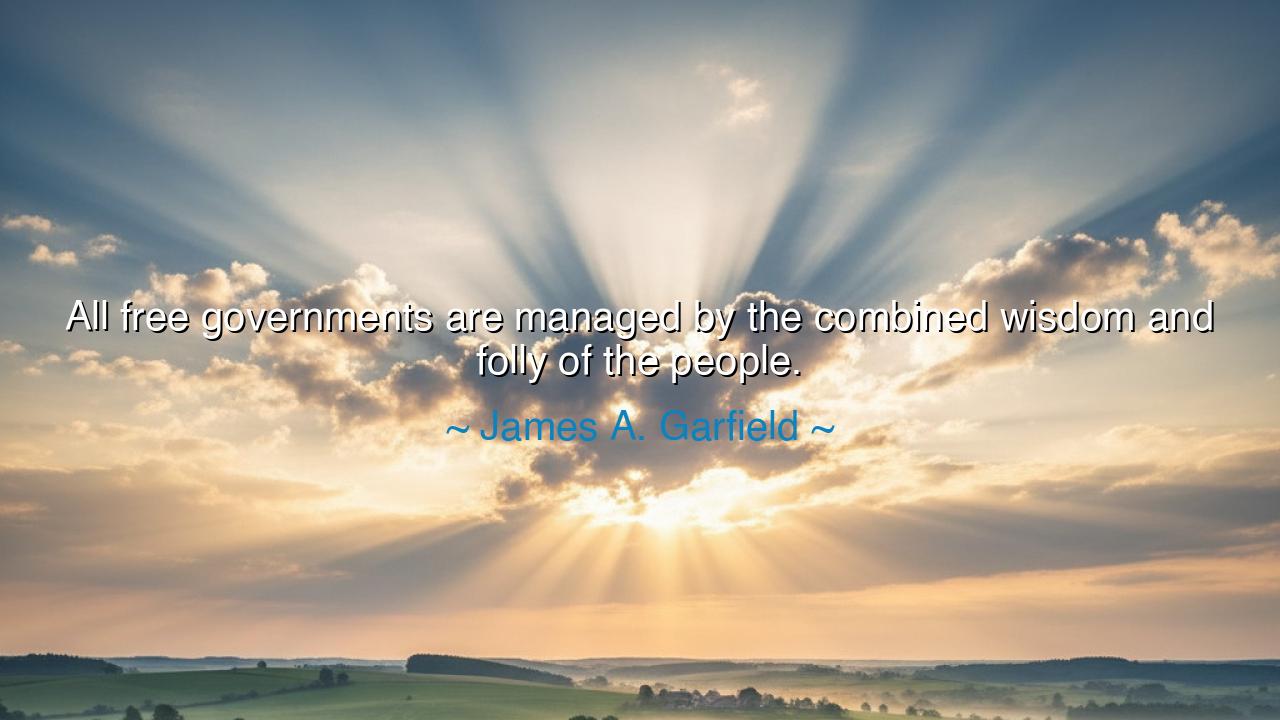
All free governments are managed by the combined wisdom and






“All free governments are managed by the combined wisdom and folly of the people.” These words from James A. Garfield strike at the heart of a profound truth about the nature of democracy. Free governments, as Garfield wisely points out, are not solely shaped by the virtuous choices of their leaders, but by the collective actions of the people — a mix of their wisdom and their folly. In a system where power rests in the hands of the many, the consequences of individual decisions ripple across the fabric of society. The wisdom of the people can build nations, while the folly of the masses can bring them to ruin. Garfield captures this eternal tension, reminding us that freedom is both a gift and a responsibility, one that demands careful stewardship from all who partake in it.
The ancients understood this delicate balance well. In Athens, the birthplace of democracy, the citizens were given the power to shape their future through direct participation in government. Pericles, the great statesman, famously declared that Athens was a city in which "the people" held supreme authority. But even Pericles knew that the wisdom of the many was a double-edged sword. For every decision made in the spirit of justice and reason, there was the potential for reckless decisions driven by passion, fear, or ignorance. Democracy, in its purest form, requires the people to rise above their folly and act with the collective wisdom of the ages.
Consider the fall of Rome, where Seneca, a Stoic philosopher, lamented the loss of virtue and the rise of corrupt leadership. The Roman Republic was a government built on the participation of its citizens, yet over time, corruption and folly infiltrated the ranks of the people. Leaders, once chosen for their wisdom, were replaced by those who could manipulate the masses, offering empty promises to gain power. The shift from republic to empire was not just the result of a few bad emperors, but the culmination of the collective foolishness of the people, who allowed their freedom to slip away. The wisdom of the masses could have saved Rome, but it was drowned in a tide of short-sightedness.
Similarly, Garfield’s words reflect the great experiment of American democracy, which, even in its early days, had its share of both wisdom and folly. The founding fathers believed in the power of the people to govern themselves, yet they were keenly aware that democracy was a fragile thing. The wisdom of men like George Washington and Thomas Jefferson was balanced against the folly of certain factions that sought to divide the nation along partisan lines. Even Washington, in his farewell address, warned against the dangers of political parties and factionalism, knowing that the wisdom of the people could be easily corrupted by personal ambition and short-sighted interests.
Thus, Garfield’s observation calls us to recognize that democracy is not a perfect system. It is the sum of the wisdom and the folly of all those who participate in it. Each individual vote, each action taken by a citizen, contributes to the collective fate of the nation. Just as in ancient Athens or in the rise and fall of Rome, the strength of a free society lies not in the wisdom of its rulers alone, but in the collective understanding of its people. Garfield’s warning reminds us that freedom requires vigilance, discernment, and above all, the willingness to learn from both our wisdom and our failures.
In conclusion, let us embrace Garfield’s wisdom: that democracy is an ongoing journey of balancing wisdom and folly, where both the triumphs and failures of the people shape the course of the nation. The task before us is not just to celebrate our freedom, but to guard it, to protect it from the forces of ignorance and self-interest that can so easily steer it off course. Only by engaging with both reason and caution can we ensure that the collective wisdom of the people will rise above the folly that threatens to undo the work of generations.






NNNgoc Ngoc
This quote prompts me to think about the tension between optimism and skepticism in democracy. On one hand, it celebrates the collective judgment of the people; on the other, it warns of inevitable missteps. I wonder if Garfield viewed this duality as a strength that ensures adaptability, or as a vulnerability that threatens stability. How might this insight guide modern policymakers in designing systems that leverage public wisdom while mitigating collective folly?
THTuan Hoang
Reading this makes me question the role of the electorate in shaping governance. If free governments depend on both wisdom and folly, does this mean that every citizen bears responsibility for the quality of decisions? I’m intrigued by the balance Garfield implies: can education and civic engagement tip the scales toward wisdom, or are human errors unavoidable? It raises deeper questions about accountability, and whether democratic structures can truly manage the imperfections inherent in people.
HDtran hai dang
I find this statement both inspiring and concerning. It recognizes the power of collective participation while admitting that mistakes are an inherent part of free government. I’m curious about how this perspective applies to modern democracies where misinformation can sway public opinion. Does Garfield imply that the system itself corrects these follies over time, or is the blend of wisdom and folly a perpetual risk? How do we ensure that the wise choices outweigh the errors?
GDGold D.dragon
This quote makes me reflect on the dual nature of democracy. It suggests that governance relies equally on insight and error, which is both humbling and realistic. I wonder how much of political success depends on the wisdom of the majority versus their follies. Can institutions be designed to balance these forces effectively, or is some level of misjudgment inevitable in any free society? How can citizens cultivate discernment to minimize the impact of collective folly?